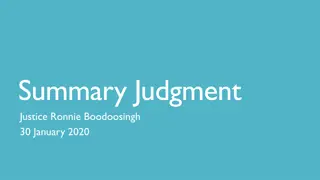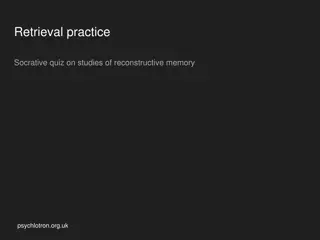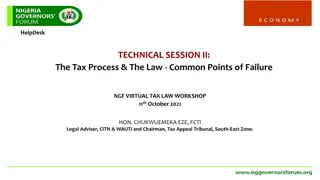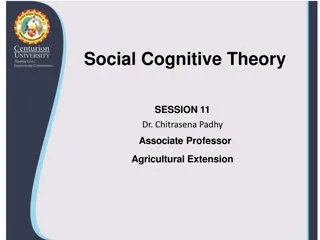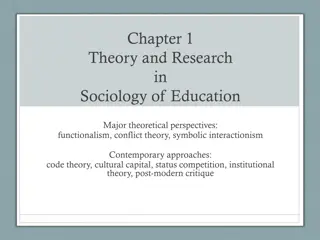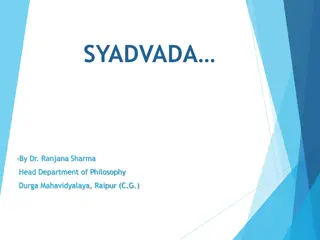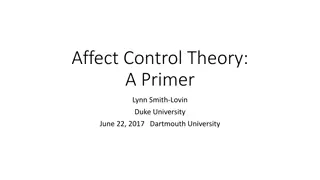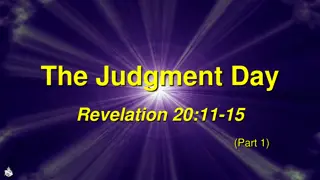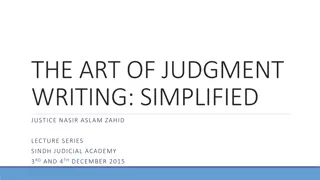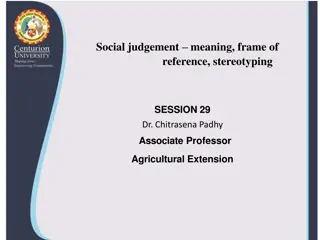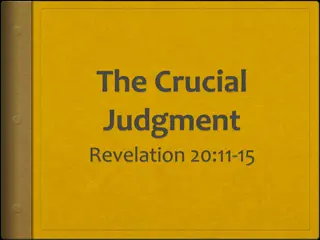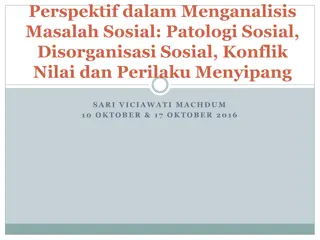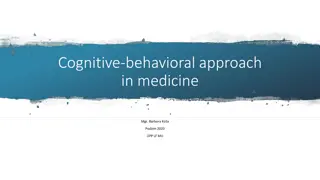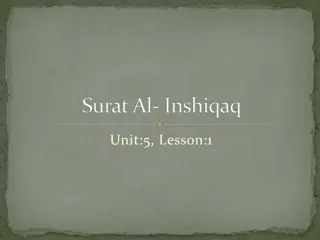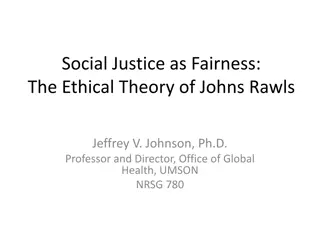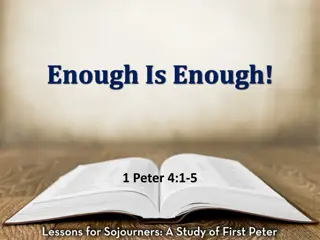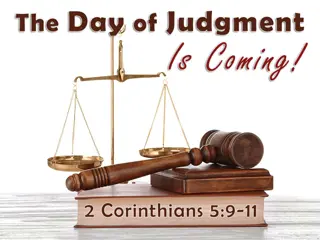Understanding Social Learning Theory and the Power of Example
Social Learning Theory, introduced by Bandura, emphasizes learning through observation and modeling. It explores how individuals acquire behavioral dispositions, trial-and-error experiences, and the impact of stimuli in the environment. The theory focuses on the importance of attention, retention, a
1 views • 17 slides
Evolution of Mathematical Theories and Proof Systems
Development of mathematical theories such as model theory, proof theory, set theory, recursion theory, and computational complexity is discussed, starting from historical perspectives with Dedekind and Peano to Godel's theorems, recursion theory's golden age in the 1930s, and advancements in proof t
1 views • 29 slides
Psychological Theories of Criminality: Understanding the Roots
Psychological theories of criminality delve into the association between intelligence, personality, learning, and criminal behavior. Major theories include Psychodynamic Theory by Freud, Behavioral Theory by Bandura, and Cognitive Theory by Kohlberg. These theories explore how unconscious mental pro
1 views • 20 slides
Understanding Summary Judgment in Legal Proceedings
Summary judgment is a legal process where a court decides on a case without a full trial when one party has no realistic chance of success. It aims to save time and resources by swiftly resolving claims. The history, availability, requirements, and overriding objective of summary judgment are explor
1 views • 8 slides
Understanding the Theory of Firms: Neoclassical vs. Modern Approaches
The theory of firms is explored through the Neoclassical and Modern perspectives. Neoclassical theory focuses on profit maximization, while Modern theory delves into managerial, principal-agent, and transaction cost theories. The discussion covers criticisms of Neoclassical theory and the essential
1 views • 79 slides
Theories of Causation in Psychological and Social Sciences
Overview of theories of causation categorized into psychological, social psychological, and sociological perspectives. Psychological theories focus on instinctive, biological, and psychological qualities of abusers, including Attachment Theory, Psychodynamic Theory, Social Learning Theory, and Situa
0 views • 15 slides
Understanding Political Theory through a Contextual Approach
Exploring G.H. Sabine's perspective on political theory through a contextual approach, emphasizing the importance of historical context and societal influences. Sabine argues that while political theory evolves with its contemporary politics, it should be analyzed within its specific time and social
0 views • 9 slides
Evaluating Bartlett's 1932 Theory of Reconstructive Memory
In this task, you will evaluate Bartlett's theory of reconstructive memory by examining its claims regarding the influence of schemas, deliberate distortion of memories, and the accuracy of memory under the impact of schemas. Through a structured analysis, you will assess each claim, present evidenc
0 views • 5 slides
Common Failures in Tax Audits and Best Judgment Assessments
Weaknesses in tax audits and best judgment assessments can result in serious consequences for tax entities. Issues such as poor audit practices by consultants and inaccuracies in best judgment approaches can lead to legal disputes and financial losses. Understanding these common points of failure is
0 views • 12 slides
Evolution of Light Theory: From Wave Theory to Quantum Theory
At the turn of the century, the discovery of the photoelectric effect challenged the wave theory of light, leading to the development of the quantum theory by Max Planck and Albert Einstein. This new theory introduced the concept of discrete energy units known as quanta, bridging the gap between wav
1 views • 62 slides
Understanding Social Cognitive Theory: Insights from Albert Bandura
Social Cognitive Theory, developed by Albert Bandura, emphasizes learning through observation and modeling behaviors. The theory explores how individuals acquire new behaviors, thoughts, and attitudes by observing others. Bandura's famous Bobo doll experiment showcased how children imitated aggressi
6 views • 17 slides
Theoretical Perspectives in Sociology of Education
Exploring major theoretical perspectives such as functionalism, conflict theory, and symbolic interactionism along with contemporary approaches like code theory, cultural capital, and status competition. The functionalist theory emphasizes social cohesion and maintaining social order through educati
3 views • 14 slides
The Final Judgment in the Book of Revelation
Revelation 20 describes the defeat of Satan and his allies, their punishment in the lake of fire, the great white throne judgment, and the final judgment of all mankind. This chapter signifies the ultimate victory of God and the eternal destiny of those who reject Him. The imagery and symbolism in R
1 views • 13 slides
Prophetic Judgments and Divine Justice in Judeo-Christian Scriptures
Various biblical passages from books like Jude, Jeremiah, Isaiah, Zechariah, and 1 Enoch foretell apocalyptic prophecies involving divine wrath, judgment, and the coming of God. These verses describe the Lord executing judgment on the ungodly, roaring against the nations, entering into judgment with
1 views • 18 slides
Dp-branes, NS5-branes, U-duality, and M-Theory Overview
Overview of Dp-branes, NS5-branes, and U-duality derived from nonabelian (2,0) theory with Lie 3-algebra. Introduction to M-theory, including M2-branes and M5-branes in the strong coupling limit. Discussion on BLG theory, Lorentzian Lie 3-algebra, and the ABJM theory for M2-branes.
1 views • 32 slides
Understanding Mindful Self-Judgment and Its Role in Mental Health
Mindful self-judgment is a complex concept that involves balancing self-awareness and self-compassion. While nonjudgment is a key aspect of mindfulness practices, there is a debate on whether mindful self-judgment can be appropriate and functional in certain circumstances. Researchers like June Pric
2 views • 46 slides
Understanding Time-Independent Perturbation Theory in Quantum Mechanics
Perturbation theory is a powerful tool in solving complex physical and mathematical problems approximately by adjusting solutions from a related problem with known solutions. This theory allows for more accurate approximate solutions by treating the difference as a small perturbation. An example inv
0 views • 19 slides
The Great White Throne - Day of Judgment and Divine Justice
The Great White Throne symbolizes a day of judgment and the ultimate standard of judgment according to the Word of God. Depicted through powerful imagery and biblical passages, the scenes describe the momentous event of judgment, highlighting the significance of upholding truth and righteousness to
1 views • 11 slides
Understanding Syadvada: Jain Theory of Judgment Explained
Syadvada, also known as the Jain theory of judgment, emphasizes the relativity of every judgment, based on the concept of Anekantvad in Jainism. According to this theory, every object has innumerable characteristics, both positive and negative. Judgments are considered relative, and complete knowled
0 views • 12 slides
Ethical Theories: Divine Command vs. Virtue Theory Explained
Divine Command Theory asserts that morality is derived from God's commands, contrasting with Virtue Theory which focuses on developing moral virtues to achieve human flourishing and excellence. Divine Command Theory relies on religious texts, while Virtue Theory emphasizes the cultivation of virtues
0 views • 24 slides
Understanding Affect Control Theory in Social Science: A Primer
Affect Control Theory explores how individuals maintain an orderly society through repeated actions. This primer delves into the theory's elements, the intellectual terrain of the 1960s, addressing questions on societal order, and the control principle. It also highlights the theory's scope conditio
0 views • 40 slides
The Judgment Day: Events, Justice, and Eternal Consequences
Explore the profound significance and series of events surrounding the Judgment Day as outlined in biblical passages. From the resurrection of the dead to the divine standard of judgment, the final reckoning before God is vividly depicted. Discover the gravity of standing before the Judge, the openi
0 views • 10 slides
Understanding Fermi Liquid Theory in Interacting Fermion Systems
Fermi liquid theory, also known as Landau-Fermi liquid theory, is a theoretical model that describes the normal state of metals at low temperatures. Introduced by Landau and further developed by Abrikosov and Khalatnikov, this theory explains the similarities and differences between interacting ferm
0 views • 23 slides
Effective Judgment Writing: Simplified Techniques for Legal Professionals
Learn about the essential aspects of judgment writing, including the role of a judge, characteristics of a good judgment, common pitfalls to avoid, and tips for effective judgment writing. Discover how to create concise, clear, and precise judgments that are easily understandable to all parties invo
0 views • 23 slides
Understanding Social Judgment Theory: Persuasion and Cognitive Maps
Social Judgment Theory (SJT) involves self-persuasion through comparing new ideas with existing attitudes. By considering an example where individuals have differing views on religion, the theory explores persuasion strategies focusing on anchors, alternatives, and ego-involvement. Reflective journa
0 views • 10 slides
The Final Judgment According to Revelation 20:11-15
The passage from Revelation 20:11-15 depicts a vivid scene of the final judgment where the dead, both small and great, stand before a great white throne. The books are opened, and individuals are judged based on their deeds. Those whose names are not found in the book of life face the second death,
0 views • 26 slides
Understanding Social Issues through Theory and Perspectives
Social theory is a system of interconnected ideas that organizes knowledge about the social world. It helps us analyze social problems like social pathology, disorganization, conflicts in values, and deviant behaviors. Differentiating theory, perspective, and model, it's key to note that theories pr
0 views • 37 slides
Understanding Cognitive Behavioral Approach in Medicine: A Heuristic Perspective
Cognitive-behavioral approach in medicine, analyzed through affective heuristics and problem-solving heuristics, explores factors influencing decision-making processes and the dual processes theory. Key concepts include fast emotional reactions, reliance on emotion in judgment, reducing cognitive lo
0 views • 30 slides
Understanding the Day of Judgment Through Surah Al-Inshiqaq
Explore the themes of the Day of Judgment, obedience, and reward vs. punishment in Surah Al-Inshiqaq. Learn about the events on that day, the fate of the obedient and disobedient, and the importance of good deeds in securing a place in Paradise. Dive into the vivid descriptions of the sky cracking,
0 views • 17 slides
Computational Learning Theory: An Overview
Computational Learning Theory explores inductive learning algorithms that generate hypotheses from training sets, emphasizing the uncertainty of generalization. The theory introduces probabilities to measure correctness and certainty, addressing challenges in learning hidden concepts. Through exampl
0 views • 43 slides
Automata Theory and Theory of Computation Overview
This course overview covers concepts in automata theory and theory of computation, including formal language classes, grammars, recognizers, theorems in automata theory, decidability, and intractability of computational problems. The Chomsky hierarchy, interplay between computing components, modern-
0 views • 42 slides
Understanding Social Neuroscience: Exploring Human Sociality and Well-Being
Social neuroscience delves into how the brain processes social interactions and their impact on human well-being. It focuses on the interconnectedness between social connections and overall life satisfaction, suggesting that humans are inherently social beings with a strong need for social belonging
2 views • 21 slides
Social Entrepreneurship and Social Inclusion in Bulgaria
The development and implementation of social entrepreneurship practices in Bulgaria aim to promote social inclusion through the development of the social economy. The focus is on combining economic results with social objectives, managed transparently with measurable, positive financial value. Vario
2 views • 12 slides
Theories of Interest in Microeconomics II
Explore various theories of interest in economics, including the Classical Theory, Liquidity Preference Theory by Keynes, Productivity Theory, Abstinence Theory, Time-Preference Theory, Fisher's Time Preference Theory, and the Loanable Fund Theory. These theories offer different perspectives on the
0 views • 6 slides
Exploring the Evolution of Atomic Theory
Delve into the historical journey of atomic theory starting from Democritus and Aristotle's views to modern advancements proving some aspects of Dalton's theory incorrect. Learn about key laws and theories such as the Particle Theory of Matter, Dalton's Atomic Theory, and JJ Thomson's discoveries, s
0 views • 30 slides
Social Justice as Fairness: The Theory of John Rawls
John Rawls' theory of justice focuses on addressing the inequalities in life prospects stemming from social starting positions. He argues that the basic structure of society must be the subject of justice regulation as it profoundly impacts individuals from the outset. Rawls emphasizes that social j
0 views • 10 slides
Enough Is Enough - A Call to Change and Preparation for Judgment
In 1 Peter 4:1-5, the message emphasizes transitioning from living according to worldly desires to embracing God's will. Christians are urged to reject sinful behaviors and withstand societal pressures, knowing that judgment looms ahead. The narrative outlines God's expectations, the world's rejecti
0 views • 5 slides
Understanding the Great White Throne Judgment in Revelation
Explore the prophetic visions of John in Revelation regarding the Great White Throne Judgment, a time of final reckoning and punishment for those who reject God's love. Learn about the significance of Jesus as the ultimate Judge and the consequences for those who do not accept Him as their Savior. R
0 views • 14 slides
Understanding Social Impact Theory Through Sedikides and Jackson (1990) Study
Explore Sedikides and Jackson's study on social impact theory, focusing on the variables manipulated and measured, along with their findings regarding Social Impact Number (SIN). Evaluate the study's support for the theory and its implications on factors like strength, immediacy, and number in socia
0 views • 18 slides
Insights on Judgment: Biblical Perspectives
Explore the profound concept of judgment as depicted in the Bible through seven key perspectives - inevitable, universal, personal, irrevocable, impartial, individual, and reasonable. The scriptures emphasize the importance of being accountable for our actions and facing the judgment before the seat
0 views • 13 slides



